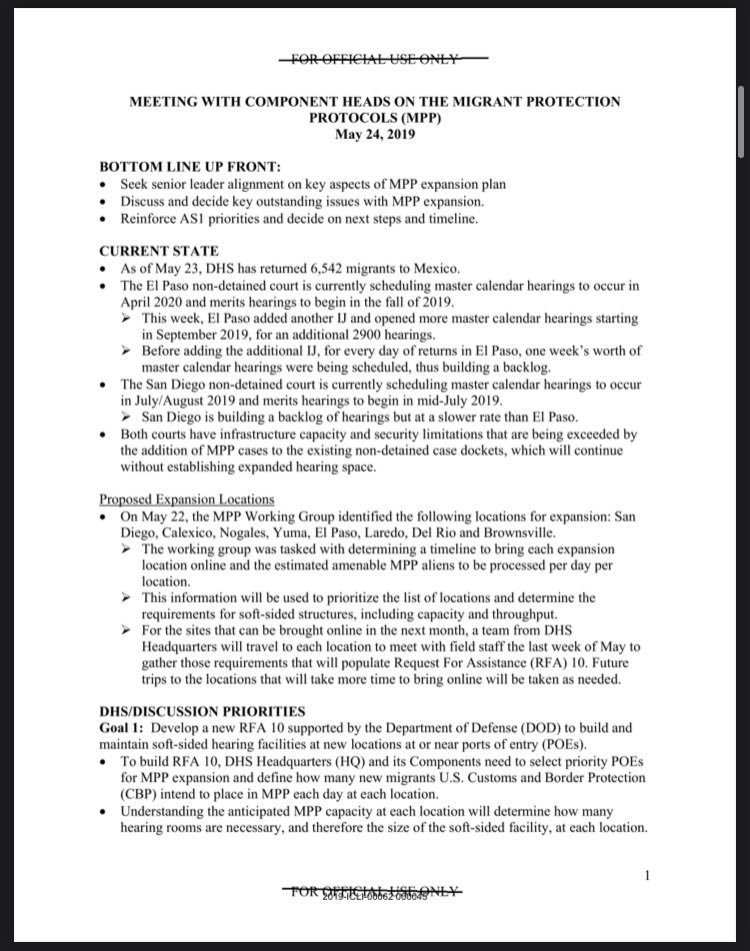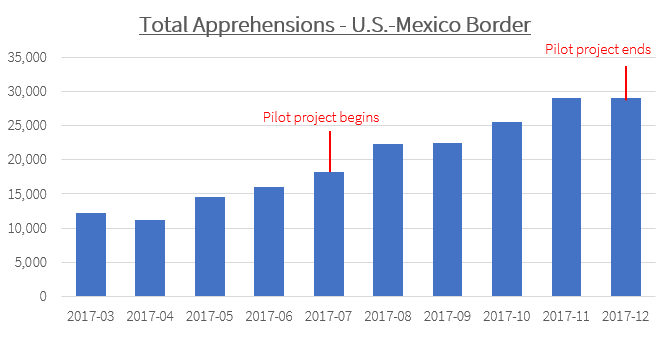
The new citizenship test reported on by @priscialva is now officially public. Citizenship applicants will now have to answer 12 of 20 questions right, up from 6 of 10.
This will inevitably lengthen the interview process and lead to fewer interviews a day.
This will inevitably lengthen the interview process and lead to fewer interviews a day.
https://twitter.com/ackocher/status/1327303950543024128
As @priscialva reported, the new test shifts many questions towards broader principles.
For example, "What do we call the first ten amendments to the Constitution?" has been replaced with "What does the Bill of Rights protect?"
Old New

For example, "What do we call the first ten amendments to the Constitution?" has been replaced with "What does the Bill of Rights protect?"
Old New

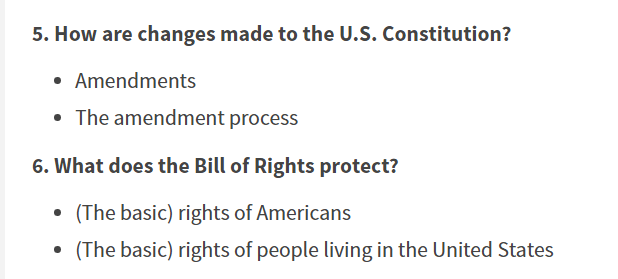
Some questions have been explicitly made harder. For example, "Name one branch or part of the government" has been replaced with "Name the three branches of government."
Notably, Senator-Elect Tuberville got this wrong yesterday
Old New

Notably, Senator-Elect Tuberville got this wrong yesterday
Old New
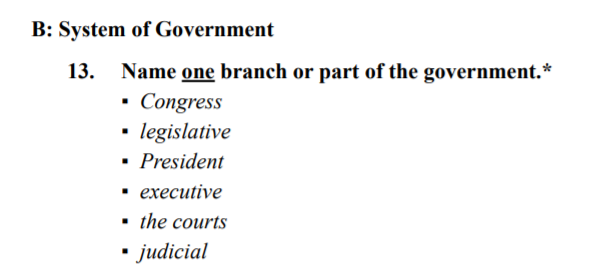
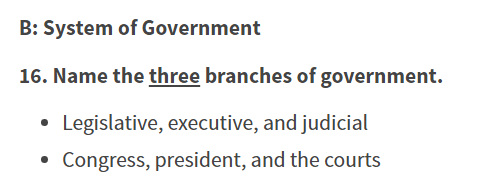
The focus on broader principles hasn't stopped USCIS from adding new questions to the test which require memorizing historical facts many U.S. citizens would struggle with, including this Q.
/also, the Federalist Papers were written after the Constitutional Convention so, uh...
/also, the Federalist Papers were written after the Constitutional Convention so, uh...
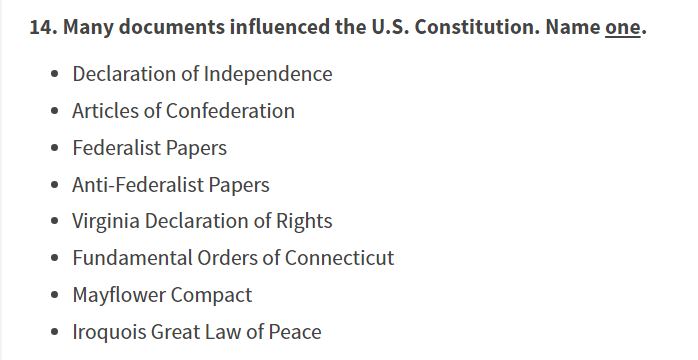
Not all the changes are benign. The answer to "Who does a US senator/congressperson represent" has been changed from "all people of the State" to "Citizens of their state."
That's a BAD change. It's completely untrue and Trumpian.
Old New

That's a BAD change. It's completely untrue and Trumpian.
Old New

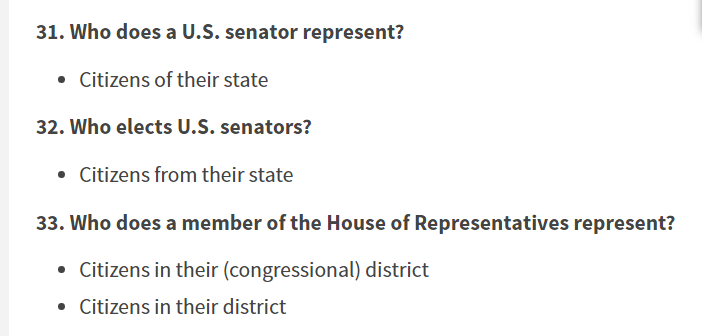
Here's a question that jumped out at me as something the vast majority of Americans couldn't answer (because the wording of the question is bizarre). 

USCIS has added a question "Why is the Electoral College important." 👀
One of the answers is purely practical; "It decides who is elected President."
The other answer is... well, I know a lot of very educated people who would disagree.
One of the answers is purely practical; "It decides who is elected President."
The other answer is... well, I know a lot of very educated people who would disagree.

Also suggesting a subtle political purpose, or a desire to talk more about federalism, a question on the 10th Amendment is new to the citizenship test. 

Here's another example of doing nothing but making the test harder; "What are two rights of everyone living in the United States" is replaced with "What are three rights of everyone living in the United States."
Old New

Old New

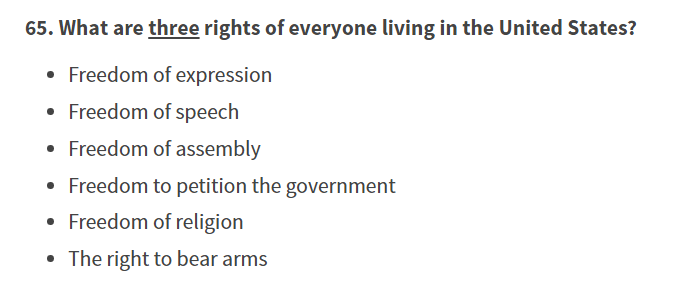
Similarly, "What is one promise you make when you become a United States citizen" has been replaced with "Name two promises that new citizens make in the Oath of Allegiance."
Old New

Old New

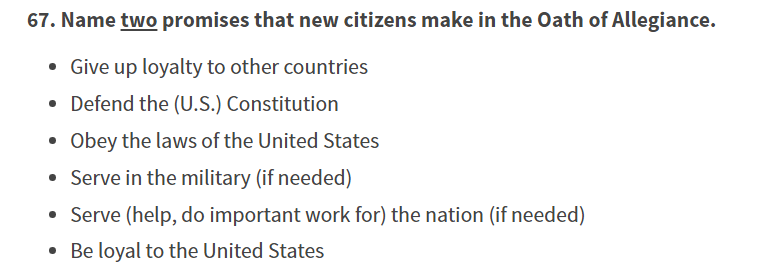
Other changes are expanding answers to previously-asked questions, like here, where you can now officially answer "the Townshend Acts" in response to a question on why Americans declared independence from Britain.
I doubt anyone will!
Old New

I doubt anyone will!
Old New

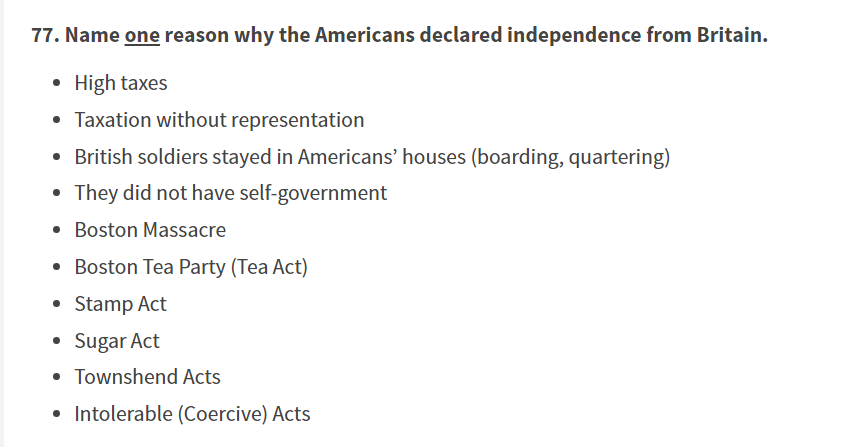
Along the lines of more difficult questions, you now need to name five of the original 13 colonies, up from three.
Old New

Old New
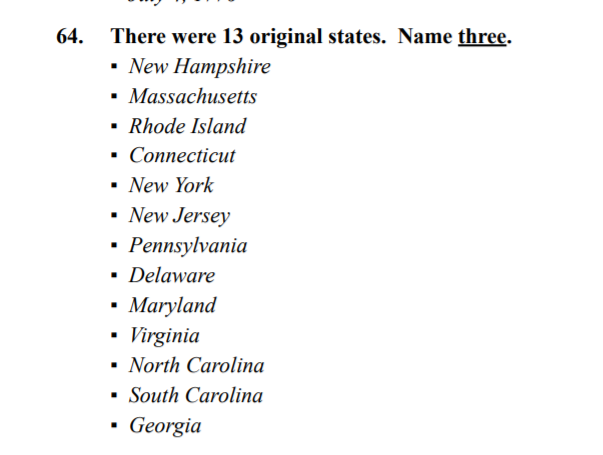
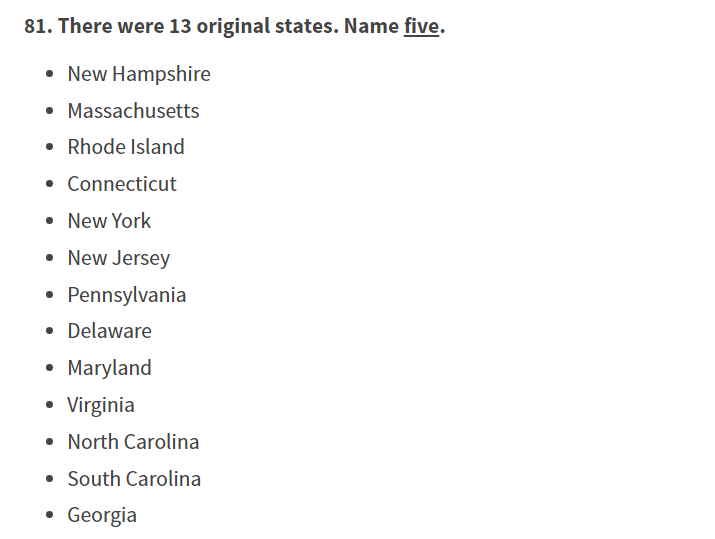
Another common theme of the question is to shift what previously were answers into broader questions.
For example, "Who is the 'Father of Our Country'" has been replaced with "George Washington is famous for many things. Name one."
Old New

For example, "Who is the 'Father of Our Country'" has been replaced with "George Washington is famous for many things. Name one."
Old New


Probably thanks to @Lin_Manuel, Alexander Hamilton now gets his own question on the citizenship test, for the first time ever. He previously was just one answer to "Name one of the writers of the Federalist Papers." 
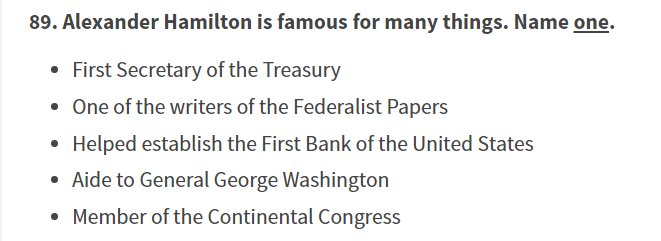
Another new question here asks people to name an "important event" of the Civil War, which also includes Lincoln's post-Appomattox assassination.
I guess USCIS agrees with John Wilkes Booth that the war wasn't over at the time?
I guess USCIS agrees with John Wilkes Booth that the war wasn't over at the time?
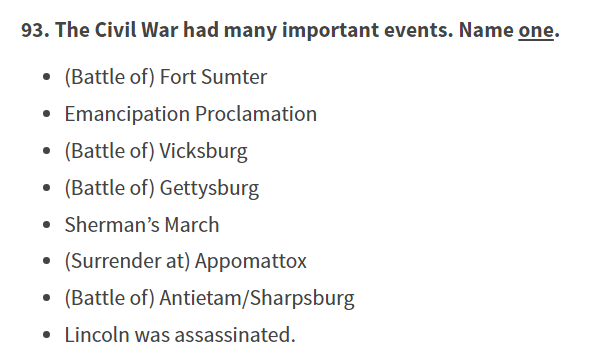
In a very 👀 choice, the old test's "Name one problem that led to the Civil War," which had "slavery" as an answer is gone. In its place is "What U.S. war ended slavery?"
There's no longer a Q on why the Civil War happened.
Old New

There's no longer a Q on why the Civil War happened.
Old New


Although there's no longer a question on why the Civil War happened, there is a new question on why World War I happened, and the answers are... very simplified.
Thankfully the citizenship test isn't big on nuance.
Thankfully the citizenship test isn't big on nuance.

Another "flip the answer into the question" framing here; before you had to know which war Dwight Eisenhower was a general in. Now you have to know what he is famous for.
These kind of changes absolutely make things harder.
Old New

These kind of changes absolutely make things harder.
Old New


Also, Domino Theory makes a major recurrence here, as the new questions "Why did the United States enter the Korean/Vietnam War" can only be answered with "To stop the spread of communism."
Again, USCIS not big on historical complexities.
Again, USCIS not big on historical complexities.
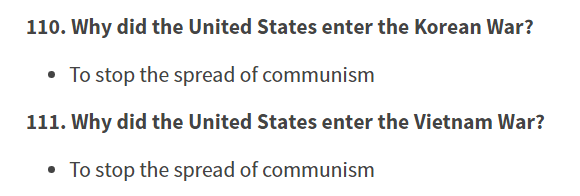
In another 👀 moment that will resonate most strongly with people who hate seeing King's work abused, the "What is MLK famous for" question can now be answered with his "content of their character" quote. Yeesh.
Old New

Old New


The "what happened on 9/11" question has gotten a lot more answers, I guess in case applicants want to expand on the events?
Old New

Old New


Here's a brand new question that has me scratching my head. Why on god's green earth would it be necessary for new citizens to know that Americans invented the integrated circuit?
/the answer, of course, is because this test is a more propagandistic than the last one.
/the answer, of course, is because this test is a more propagandistic than the last one.
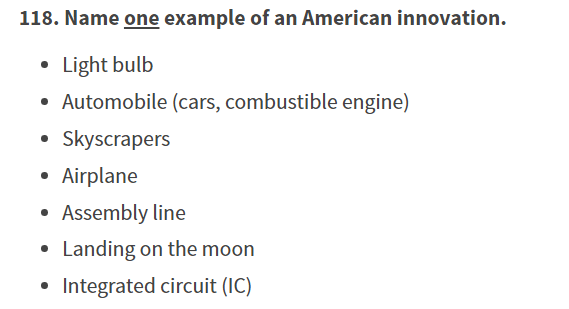
In a major blow to geography, they have entirely eliminated the "Geography" section of the old citizenship test, keeping only questions on the U.S. Capital and "Where is the Statue of Liberty."
Old New

Old New
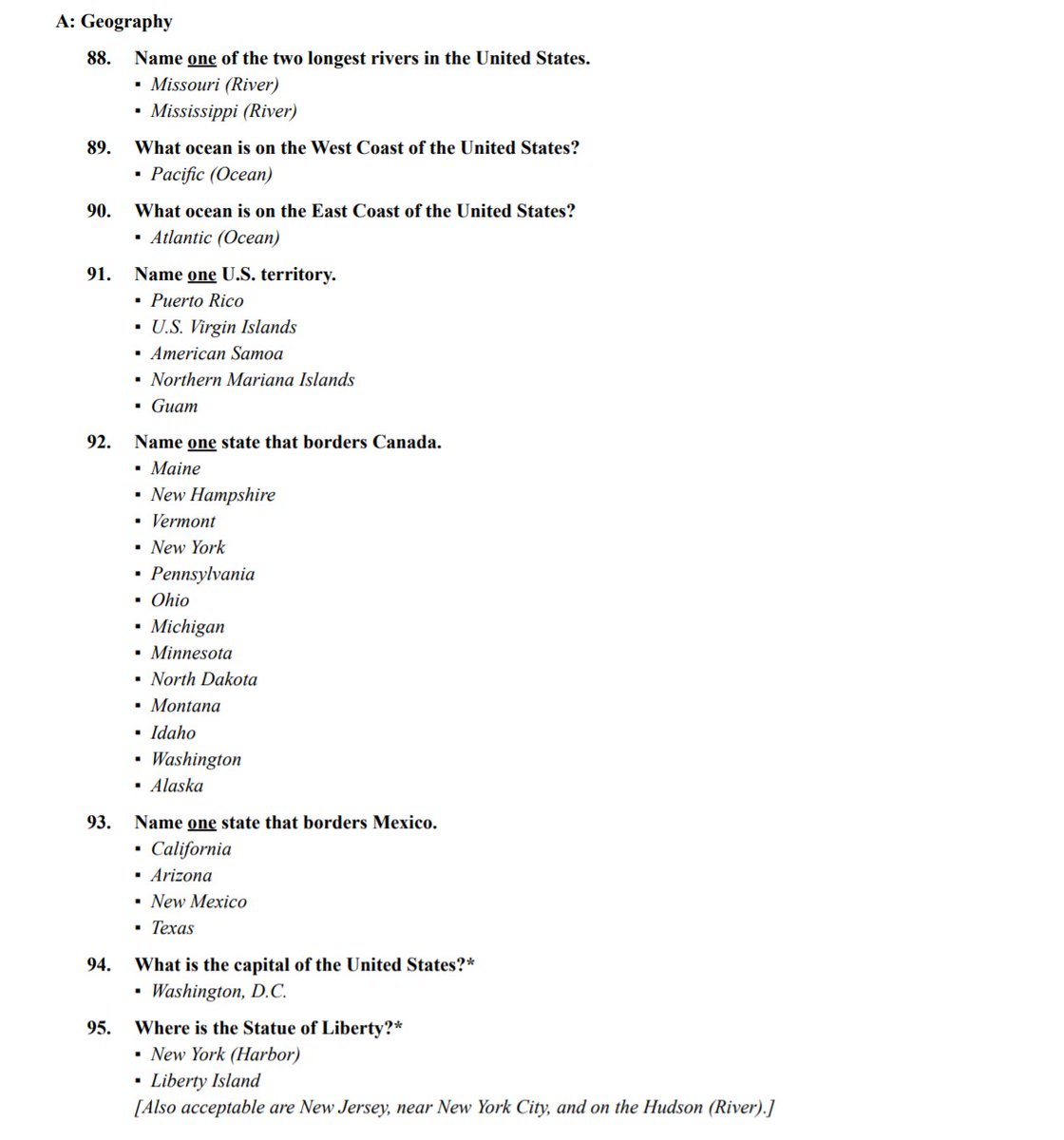
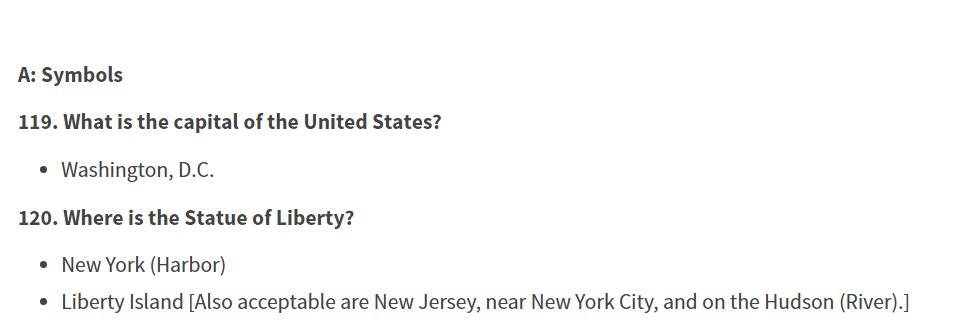
Okay, here's my thoughts on the new test:
- The test has gotten overall more difficult.
- Many new Qs are totally fine.
- Some new Qs are confusingly worded.
- This particular question is historically inaccurate, overtly political, and must be removed.
- The test has gotten overall more difficult.
- Many new Qs are totally fine.
- Some new Qs are confusingly worded.
- This particular question is historically inaccurate, overtly political, and must be removed.
https://twitter.com/ReichlinMelnick/status/1327312188269268997
The overall tilt of the new question is subtly more political than before. The Citizenship Test was always somewhat "USA! USA! USA!" but this new version tilts even further towards a view that aligns itself with those leading the backlash to things like the 1619 Project.
One of the most subtle examples of this alignment I can think of is that the new test drops the "why did the Civil War happen" question from the old test (for which slavery was an answer), but adds new questions on why WWI, WWII, and the Vietnam & Korean Wars happened.
• • •
Missing some Tweet in this thread? You can try to
force a refresh












